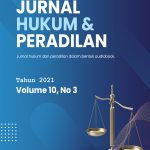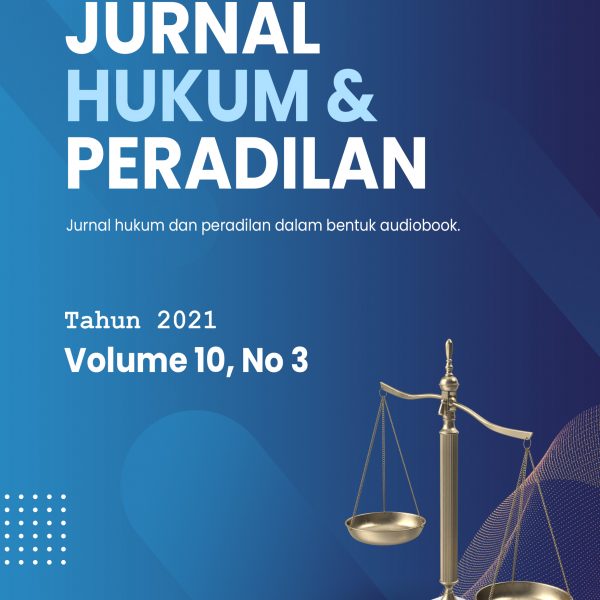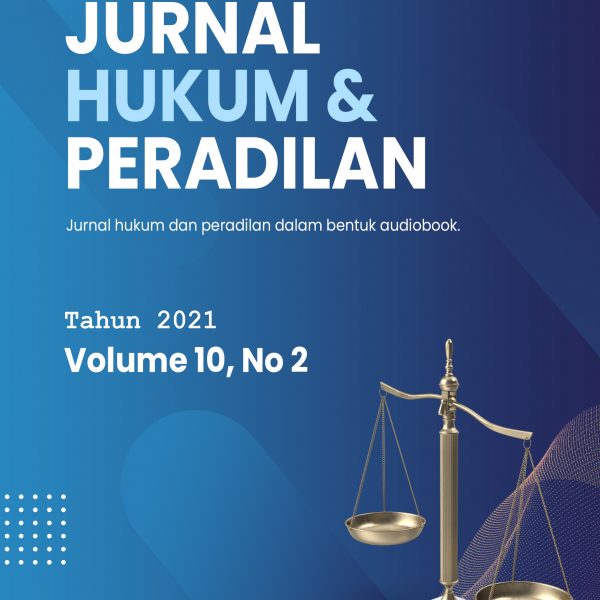
Jurnal Tahun 2021
Volume 10, No 1
Abstrak.
The emergence of e-Court as a modernization on trials enabled the judicial process to run online. The application allowed users, including Persons with Disabilities (PwD). Since the online system is essentially similar to the on-site one, the judicial process should consider reasonable accommodation. Moreover, considering Government Regulation Number 39 of 2020 concerning Reasonable Accommodations for Person with Disabilities (Regulation of Reasonable Accommodation in Judicial Process), the types of accommodations to enable PwD to use the online system must be clear. How the reasonable accommodations provided in e-Court is the issue of this research. The method of research used to elaborate on this issue is the normative juridical method. Patterns of problem approach are statute approach and conceptual approach. Meanwhile, the Analytical Descriptive method is used to construct the data. In this writing, automated online web accessibility tests showed that the medium percentage of the e-Court’s accessibility is used to bolder the analysis. This writing elaborated the accessibility of e-Court and the components of the information within which needed to be enhanced for providing reasonable accommodation for Persons with Disabilities, mainly in the form of service. It also touched on the Standard of Judicial Process involving Persons with Disabilities and the provision of the Companion and/ or the Translator for Persons with Disabilities during the trial process linked with the personal assessment and the participation of society.
Abstract.
This study focuses on the legal certainty of the implementation of loans for mortgage rights which are the object of collateral in the form of money-valued objects when bad loan occurs, which are regulated in the main agreement as an effort to manifest the trust of creditors of banking institutions whose existence is highly sought after by the Indonesian people. The method used in this study focuses on the normative with the conceptual approach and statute approach. The results of this study indicate that Credit agreements must be considered by the bank as creditor and by the customer as the debtor, considering that credit agreements have a vital function in granting, managing, and managing the credit itself. The existence of a guarantee in a bank credit agreement is significant, namely as a means of legal protection for bank security in overcoming risks. There is a certainty that the debtor customer will pay off his loan. This is based on the explanation of Banking Laws, PBI, and POJK, which requires banks’ caution as creditors for loans to debtors based on the belief in the debtor’s ability to pay off his obligations as agreed in the agreement. The land is material security which is most in demand by banking institutions as security of mortgage rights. The use of land as a trusted and consumptive credit is based on the consideration of the safest land and has a relatively high sale value. The urgency of objects Securing mortgage rights as stipulated in the credit agreement cannot be separated from the guarantee itself. Credit guarantees are always stated in an additional agreement, namely the Collateral agreement. The need for funds by people or institutions provides credit by providing excellent services and providing legal protection for the parties in the transaction so that no one is harmed in the transaction. The state provides legal protection by stipulating legal regulation relating to credit so that banks as creditors have legal certainty in the process of executing credit collateral objects for optimal repayment. Mortgage Law states that creditors have full rights in executing debtor’s collateral goods when bad loans do not have to go through litigation.
Abstract.
This paper aims to describe the differences and the position of the legal rules for juvenile crimes between Qanun 6 of 2014 and Law Number 11 of 2012 concerning the Juvenile Criminal Justice System. This research is descriptive qualitative research. The results show that Qanun Number 6 of 2014 also regulates criminal sanctions for children, which are normatively regulated in Law Number 11 of 2012. In addition, Qanun, as Aceh Islamic criminal law legalizes canning punishment for children, as well as the double-track system adopted by The Law of Juvenile Criminal Justice System is not explicitly accommodated in Qanun. Qanun at the level of a Regional Regulation is part of the hierarchy of laws and regulations that should be in line with what generally applies at the national level. Law Number 11 of 2006 is being the basis of the authority to make Qanun, as long as there is no court decision invalidates it, Qanun Number 6 of 2014, which is a derivative of Law Number 11 of 2006, can be declared as “lex specialis” of The Juvenile Criminal Justice System law which regulates child crime. However, it does not rule out the possibility that in the future, the judicial review of the article can be conducted.
Abstract.
Abstract.
This study is a type of empirical legal study conducted based on the discrepancy between the existing provisions and theories and the legal facts occurring among the society, that is, the transaction of goods carried out by crossing the border between two countries.
Any hindering obstacles and barricades to the law enforcement over illegal businesses can be settled through social and cultural, economic, political, and security approaches. Alternative solutions that should be applied in dealing with such legal issues can be establishing buildings in the border area, which are specifically directed to help accelerate the handling of three fundamental problems faced in the scope of the development of the border area in question, one of which is delimitation and delineation aspects of the state’s boundaries, the aspect of affirming national borders on watershed areas between Indonesia and Timor Leste, the aspect of development discrepancy in the form of fulfilling infrastructure needs in the economic field to foster opportunities for the border areas to participate and compete amid both global and regional markets.
Abstrak.
Konsep subjek hukum adalah salahkonsep inti dalam hukum. Dalam teori tradisional, konsep ini hanya dimaknai hanya berkaitan dengan hak dan kewajiban belaka. Sementara Hans Kelsen melihat bahwa ada persoalan kuasa dalam hak dan kewajiban. Namun, kuasa ini bukanlah kuasa terutama dalam konsep subjek hukum, karena menurut teori tradisional, ada kuasa di baliknya yang menentukan sesuatu itu adalah subjek hukum yang memiliki kuasa hak atau tidak. Relasi antarkuasa ini berpotensi tidak adil, dan bahkan berpotensi menjadi jahat, karena secara potensial ada manipulasi berbaur fiksi atas nama keyakinan agama atau pandangan sosial tertentu, sehingga si penguasa ini dapat menentukan sesuatu itu adalah subjek hukum yang memiliki kuasa atau tidak. Jikalau tidak memiliki kuasa, maka sanksi akan disiapkan untuk menghukum perilaku yang dianggap menyimpang.
Abstrak.
Kompilasi Hukum Islam (KHI) tidak mengatur waris beda agama secara jelas, KHI hanya mensyaratkan pewaris dan ahli waris memiliki agama yang sama. Di pengadilan, hakim-hakim Pengadilan Agama menggunakan wasiat wajibah untuk membagi harta warisan dengan ahli waris non-Muslim, berdasarkan yurisprudensi Mahkamah Agung Nomor 368 K/AG/1995. Sebagai hasilnya, perbedaan agama masih menjadi halangan bagi Muslim dan non-Muslim untuk saling mewarisi karena penerapan hukum tanpa mempertimbangkan illat hukum larangan waris beda agama. Dalam hal ini, penting untuk meneliti illat hukum hadis yang melarang waris beda agama sebagaimana yang dicoba dilakukan oleh artikel ini. Untuk melakukan penelitian tersebut, penulis menggunakan pendekatan usul fikih dan hermeneutika. Hasilnya, penulis sampai pada kesimpulan bahwa illat hukum hadis yang melarang waris beda agama adalah karena unsur permusuhan dan kejahatan, dan bukan karena perbedaan agama.
Abstract.
The imposition of ultra petita decisions in the practice of criminal law enforcement in Indonesia continues to be going on today. This paper tries to examine the ultra petita decisions with the provisions in the Criminal Procedure Code, and the principle of freedom and the active role of judges. In answering the problem, the writer makes use of a type of normative legal research that’s done by researching positive law. The results of the discussion display that the Criminal Procedure Code doesn’t prohibit judges from imposing ultra petita decisions. In examining criminal cases, the judge can impose decisions that are outside of the requisition or exceed the requisition of the public prosecutor. The Criminal Procedure Code only stipulates that the basis for the judge in imposing a decision is the bill of indictment. Justification for the imposition of decisions is also based on the principle of judge freedomand judges are active. Under these two principles, judges are free to impose decisions without influence from other parties and actively searching for out facts that are revealed in court for the realization of material truth as the aims of criminal procedural law. The writer’s recommendations are: 1) Criminal law enforcers (judges, public prosecutors, lawyers/ defendants) need to form a common awareness that ultra petita decisions are permitted; 2) The rule by which the judge gives the ultra petita decisions needs to be made immediately, each for the short and long term.






